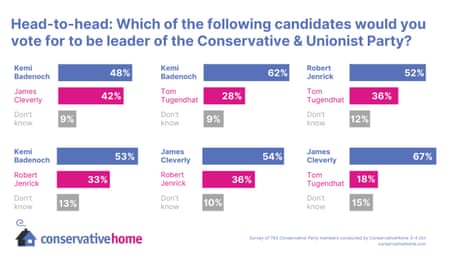Even a week ago, at Conservative conference, Jenrick was still ahead. The big news, in polling terms, this time last week was that Jenrick had just about caught up with Kemi Badenoch in terms of popularity with members.
But the rise of James Cleverly (a distant third in the race this time last week) has been extraordinary. There were 16 votes up for grabs in the ballot this afternoon (MPs who voted for Mel Stride before he was eliminated). Cleverly’s vote went up by 18 – suggesting he could have picked up the entire Stride haul, and won over two extra people too. In reality, some of the Stride votes may have gone elsewhere, and there is likely to have been some churn (people who voted for one candidate last time switching to another). Still, it is close to a clean sweep.
Last week it was clear that Cleverly had “won” the final hustings by delivering the best speech on the final day. But I don’t think there were any commentators who realised on the day quite to what extent that speech would upend the race.
Now Cleverly and Badenoch both have a path to victory. For Jenrick, it is much harder.
A survey of Tory members by ConservativeHome at the weekend implies that, if Cleverly and Badenoch are on the final ballot, Badenoch will win narrowly. Here are the figures, which suggest she is ahead of him by 48% to 42%, with don’t knows at 9%. If Badenoch can make the final ballot tomorrow, by overtaking Jenrick, and if she can hold this lead with members, she can win.

Cleverly’s best chance of becoming leader would involve going into a final ballot against Jenrick. These figures suggest he would win quite easily, as they put him on 54% against Jenrick’s 36%. That means Cleverly supporters may be tempted to lend votes to Jenrick to get him over the line tomorrow. This happened in 2019, when Boris Johnson wanted to be up against Jeremy Hunt, not Michael Gove, in the final ballot. But it’s a risky enterprise.
For Jenrick, there is no obvious route to victory as things stand now.
Of course, a survey is just a survey and, as the last week has shown, in an electoral contest people change their mind about the candidates. Perhaps Jenrick could make the final two and turn things around. But today he’s trailing.
2.59pm.) In a statement the group’s co-executive director Areeba Hamid said:
Lord Walney’s chief contribution as the government’s ‘anti-extremism’ adviser was to come up with a series of absurd proposals on how to criminalise peaceful protest. As our overcrowded prisons fill up with climate protesters, some facing longer terms than violent criminals, it’s clear that the last thing ministers need is more of the same advice from him.
-
Boris Johnson has been ridiculed for claiming that he had to embark on a controvesial, and expensive, refurbishment of the 11 Downing Street flat when he was PM because it “looked like a crack den”. His predecessor in the flat was Theresa May, and on social media various people have pointed out that she’s not the type to live like that. This is from Christian Calgie from the Express.
And this is from the Tory peer Daniel Finkelstein.
But, according to the LBC transcript, Johnson actually said:
Frankly, once I pulled the carpets out of the flat in Number 11, which is where we lived, because Dylan was then in the stages of being — the whole thing was looking a bit like a crack den to be totally honest, and it needed to be refurbished.
Johnson was referring to Dylan, his dog, being housetrained, and he seems to be admitting he personally made the flat a mess, by tearing out the carpets.
happened in 2001, when the late Michael Ancram and David Davis were tied in last place. There was no provision in the rules for what should happen, and so Michael Spicer, the 1922 Committee chair, ordered a rerun the following day, with the proviso that both candidates would drop out if they were tied again. But on the second vote Ancram was eliminated.
From Esther Webber from Politico
Feels like this could (just about) be good news for Kemi – Tugendhat having recently beefed with Jenrick, while Cleverly’s backers might also be keen to see off Jenrick
From Tom Harwood from GB News
Tomorrow will be absolutely fascinating.
So many dynamics at play:
Is there still a ‘stop Kemi’ vote?
Has hardline ECHR position damaged Jenrick with MPs?
Do Tugendhat MPs who want Cleverly try to be ‘clever’ and back a different candidate attempting to engineer an easier final?
£134m on locum psychiatrists over the last five years, largely drawn from recruitment agencies and private health companies.
Maree Todd was challenged about the findings by Edward Mountain, from the Scottish Conservatives, and Paul Sweeney, from Scottish Labour, at Holyrood on Tuesday afternoon.
Mountain said the data, which established that spending on locums and emergency cover was increasing year on year, showed mental health services were “at breaking point” and the consequence of poor work-force planning.
Sweeney said the response to the staffing crisis was “an extortionate sticking plaster of spending over £130m on locum psychiatrists”, with boards paying up to £837 an hour to plug the gaps. “Is the minister’s idea of a robust NHS workforce strategy, anything resembling that sort of figure?”
Todd said she is “absolutely in no doubt” there were recruitment challenges in NHS psychiatry and “certainly” accepted concerns that some locums were paid to do online consultations from outside the UK, including one who dialled in from India.
“I am absolutely aware of the challenges which exist across the workforce and which can be particularly marked in more remote and rural areas,” she said, adding that as a former mental health nurse for NHS Highlands, she was acutely aware of the problem.
She said Neil Gray, the Scottish health secretary, was meeting the Royal College of Psychiatrists on Thursday to discuss the staffing crisis, while several working groups had been formed to investigate longer-term solutions, on improved recruitment of psychiatrists and on the extensive use of locums.
Todd said medical school psychiatry places were full and significant sums being spent across mental health services in the NHS. She added:
There is undoubtedly a rise in demand that we have seen in some parts of the country. These are pressures which could not have been predicted. So that relates to the reduction in stigma associated with these causes, but it undoubtedly adds to the challenge in managing the current situation.
said:
Commiserations to my friend @TomTugendhat. He ran a great campaign and led the debate on security and how we stand tall on the world stage in volatile times.
I’m pleased to have increased support and grateful to all of my colleagues who voted for me. This is a very tight race and I’ll continue fighting for every vote. It’s also clear from every independent poll and survey, the support from members for my @Renewal2030 campaign is surging.
Robert Jenrick was the clear bookmaker’s favourite in the Tory leadership contest. Going back to a point before the general election, Kemi Badenoch was favourite for a long time, but the odds shifted when political insiders started to take the view she was unlikely to make the final ballot.
Even a week ago, at Conservative conference, Jenrick was still ahead. The big news, in polling terms, this time last week was that Jenrick had just about caught up with Kemi Badenoch in terms of popularity with members.
But the rise of James Cleverly (a distant third in the race this time last week) has been extraordinary. There were 16 votes up for grabs in the ballot this afternoon (MPs who voted for Mel Stride before he was eliminated). Cleverly’s vote went up by 18 – suggesting he could have picked up the entire Stride haul, and won over two extra people too. In reality, some of the Stride votes may have gone elsewhere, and there is likely to have been some churn (people who voted for one candidate last time switching to another). Still, it is close to a clean sweep.
Last week it was clear that Cleverly had “won” the final hustings by delivering the best speech on the final day. But I don’t think there were any commentators who realised on the day quite to what extent that speech would upend the race.
Now Cleverly and Badenoch both have a path to victory. For Jenrick, it is much harder.
A survey of Tory members by ConservativeHome at the weekend implies that, if Cleverly and Badenoch are on the final ballot, Badenoch will win narrowly. Here are the figures, which suggest she is ahead of him by 48% to 42%, with don’t knows at 9%. If Badenoch can make the final ballot tomorrow, by overtaking Jenrick, and if she can hold this lead with members, she can win.
Cleverly’s best chance of becoming leader would involve going into a final ballot against Jenrick. These figures suggest he would win quite easily, as they put him on 54% against Jenrick’s 36%. That means Cleverly supporters may be tempted to lend votes to Jenrick to get him over the line tomorrow. This happened in 2019, when Boris Johnson wanted to be up against Jeremy Hunt, not Michael Gove, in the final ballot. But it’s a risky enterprise.
For Jenrick, there is no obvious route to victory as things stand now.
Of course, a survey is just a survey and, as the last week has shown, in an electoral contest people change their mind about the candidates. Perhaps Jenrick could make the final two and turn things around. But today he’s trailing.
How to Win an Election podcast, Mandelson, who was a key fixer when New Labour was in government, said:
One of the problems for the Starmer administration is that there was an ambiguity about what the role of Number 10 was right at the beginning. And Keir had given a signal that he didn’t want to run a command and control Number 10 operation. He wanted to give more freedom, more autonomy to departments. He didn’t want to second guess everyone. He wanted to give people wriggle room. Well, I’m afraid that the great ship of state called the British Nation and Government doesn’t work like that.
[It] requires a very good, quite complex, quite sophisticated machine at Number 10. And the truth is that for all the preparation that was made for government by the Starmer team, it wasn’t done to the extent or in the way it should have been. There wasn’t enough sort of pinning down and agreement amongst everyone as to how it should operate. And once in government, you know, people’s different roles were not frankly communicated as they needed to be. So, it wasn’t all joined up, I’m afraid.
This is an implicit criticism of Sue Gray, who was replaced on Sunday as Starmer’s chief of staff. Gray was in charge of the transition into government when Labour was in opposition.
Mandelson also praised Morgan McSweeney, Gray’s replacement, saying he would be “a very hard taskmasker” for people working in No 10.
Morgan McSweeney, I believe, he’s the sort of person who knows what excellence is and he will insist on having the best people in the jobs. He will always be available to them. He will always counsel them. He will always give them advice, but he will expect them to get on with their jobs and to deliver. And if they do, they’ll be fine and safe. And if they don’t, then I’m afraid they will be out. He’s a very hard taskmaster.
The former Labour MP John Woodcock is no longer the government’s independent adviser on political violence and disruption, according to Adam Bienkov from Byline Times. The Home Office has confirmed that Woodcock has left the post.
Woodcock was elected a Labour MP in 2010 but he was very critical of Jeremy Corbyn when Corbyn was leader, left the party partly as a result of disciplinary proceedings that he said were politically motivated and at the time of the 2019 election urged people to vote for Boris Johnson, not Corbyn. He was subsequently given a peerage, as Lord Walney, and he became the political violence adviser in 2020.
In May this year he published a report with recommendations that were criticised as draconian. The then Conservative government only gave it a lukewarm reception, and Labour has not embraced the recommendations either.
their voting intention polling figures mentioned earlier. This is from Luke Tryl’s, its director, who also points out that the combined total for parties on the right (47% – Conservatives 28%, plus Reform UK 19%) is almost the same as the combined total for parties on the left (49% – Labour 29%, Lib Dems 11%, Greens 7% and SNP 2%).
new polling by Ipsos..
In its write-up, Ipsos says:
When asked which leadership candidate would be most likely to become prime minister if they become Conservative leader, one in five Britons say James Cleverly (21%) marking a 7-point increase since late September 2024 before Conservative party conference. Robert Jenrick trails behind at 10%, with Tom Tugendhat and Kemi Badenoch at 7% each. The main shift here being between those saying don’t know (-6) and those saying Mr Cleverly is most likely (+7).
However, more than one in four still say they don’t know (27%) and 28% think none of the candidates are likely to become prime minister.
But the polling also suggests, as the public heard and read about the last four candidates in the contest while the Tory conference was happening, all of them saw their net favourability ratings with the public at large go down. Cleverly’s ratings only fell by 2 points, from -16 to -18. But Tom Tugendhat’s fell by 6 points, and Kemi Badenoch’s and Robert Jenrick’s both fell by 8 points.
On this measure, Badenoch is the most unpopular candidate, with a net favourability rating of -26, followed by Jenrick (-24), Tugendhat (-19) and Cleverly (-18).
here).
Source: theguardian.com


















